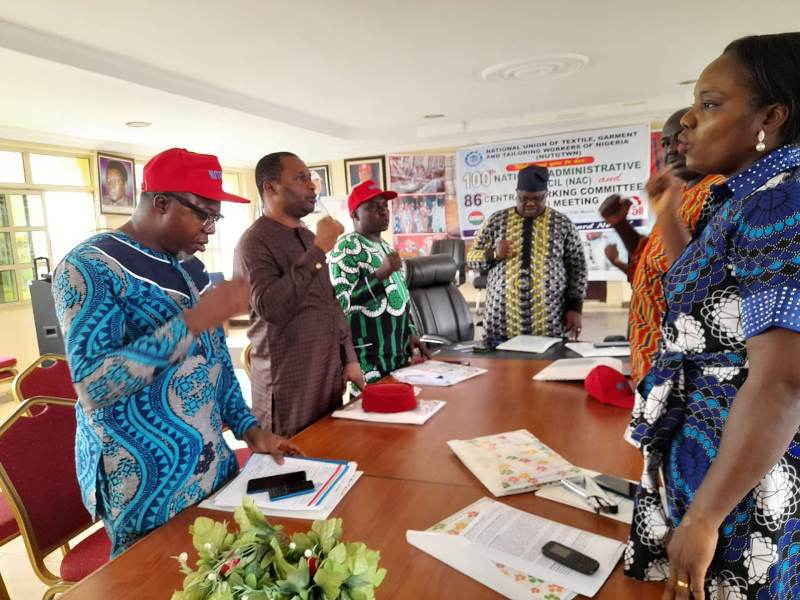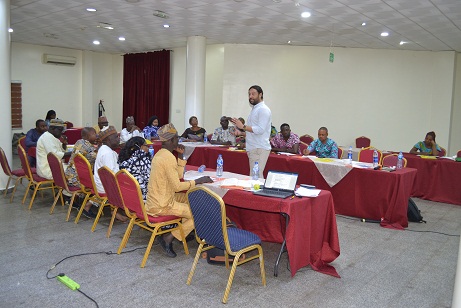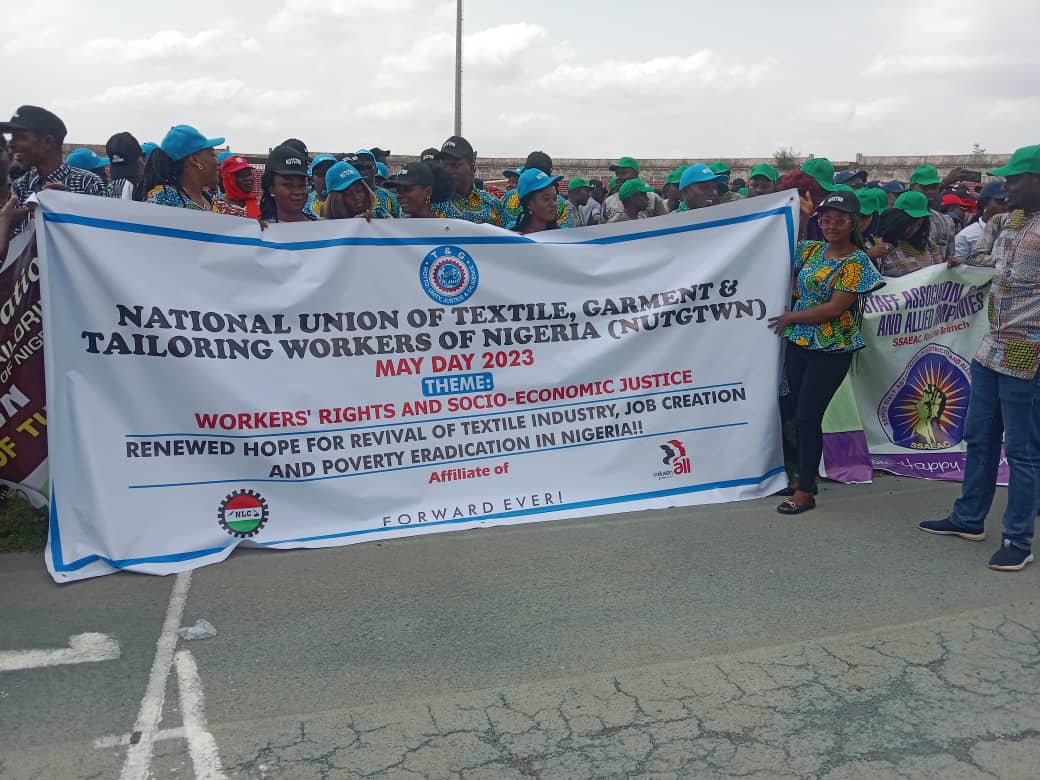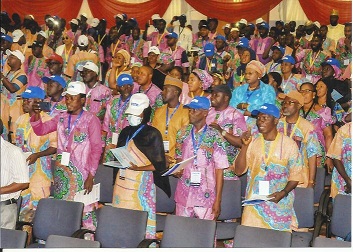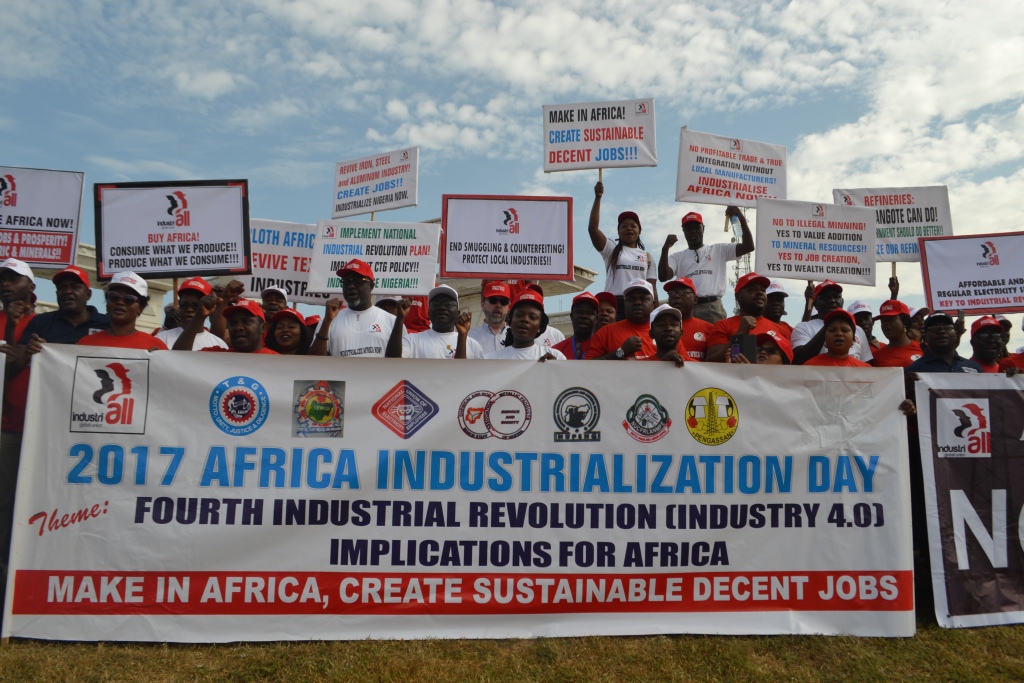
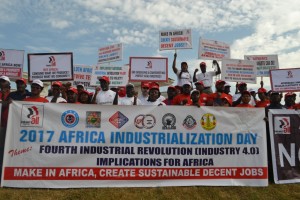
GREETINGS
Comradely Greetings on behalf of the Executive Council (NEC) of the IndustriALL Global Union Africa. Industriall global organizes 50 million manufacturing workers along the global value chains in 140 countries in over 700 trade unions. Sustainable industrial policy is one of the 5 critical success goals of our global union. Other strategic 4 goals of IndustriALL Global Union endorsed by its 2016 Congress in Rio de Janeiro Brazil are; 1. Build Union Power, Confront Global Capital, Defend Workers’ Rights: and Fight Precarious Work.
HAVING held 6 policy dialogues and series of engagements with our governments on critical issue of industrialization and development in the past 10 years, affiliates of Industriall in Africa resolve as follows;
GIVEN the impact on national development, employment, climate and living standard of the citizens, Industrialization and industrial policies are too important to be left to governments and businesses alone.
RESOLVED to constructively engage with our governments, businesses, investors and employers as well as development institutions CBN, BOI, UNIDO on all issues aimed at promoting Industrialization and beneficiation in Africa.
OBSERVED that Industry is a key driver of sustainable jobs and development for national economies and the foundation of good living standards.
NOTED that It does not matter whether it is first industrial revolution, (Industry 1.0), Second Industrial Revolution (2.0) Third Industrial Revolution (Industry 3.0) or the Fourth Industrial Revolution (Industry 4.0), Africans must make what we wear (gold, rings and necklaces, clothes and textile), what we ride, (automobiles), what fuel our cars (petroleum products) what we build with (iron and steel), soaps we bath with (chemicals and allied products) and generate energy we consume.
DEMANDED that Africa must stop exporting raw cottons, crude oil, mineral resources, gold and diamond only to be importing finished goods from China, Europe and America. With large small or medium scale enterprises, Africa must consume products it produces not imported or smuggled as it is the case in Nigeria.
REALIZED that United Nations Industrial Development Organization (UNIDO) had over the years had shown that manufacturing industry in Sub-Saharan Africa (SSA) lags behind other developing regions of the world.
OBSERVED FURTHER that there are three leading economies in Africa namely Nigeria which worths some $406 billion, Egypt $332.3 billion and South Africa $294.1billion.
HOWEVER in terms of manufacturing value added South Africa at 25 per cent is the highest, followed by Egypt at 20 per cent and Nigeria with less than 5 per cent. Ghana is even more industrialized at 6 per cent manufacturing value added (MVA).
CONSCIOUS THAT in 2015 Africa had as many as 1.2 billion population. Millions of youths join the labour market annually without jobs making them voluntary slaves to Europe and America after three hundreds Africa put an end to forced slavery.
CONCLUDED that only industry can provide sustainable jobs and living wages and necessary revenues for government to provide the needed infrastructure for development.
INDEED for Africa to meet the Sustainable Development Goal 2030, especially SDG 9 dealing with industry and innovation Africa continent must innovate and industrialize. Africa must copy China’s industrialization drive which has within 20 years moved over 250 million people out of poverty through manufacturing and industrialization. Africa must make what it consumes, otherwise it will be consumed by the rest of the world.
AFRICAN GOVERNMENTS MUST WORK THE TALK
OBSERVED that many African countries commendably have put in place robust documents and policies on industrialization and diversification, but capacity utilization is still very low wth few existing industries closing down with mass job losses. It’s time South Africa, Nigeria, Senegal, Ghana! Zimbabwe, Sudan walked/worked the policies and add value to the continent abundant raw materials.
ACKNOWLEDGED and commend the Federal Government of Nigeria for launching the Economic Recovery and Growth Plan. Together with the existing National Industrial Revolution Plan, the Plan can promote revival of industries and creation of mass decent jobs.
HAILED a number of commendable initiatives by African governments in promoting wealth generation and reviving the industry, such as Buy-Africa campaign in South Africa and Buy Made-in-Nigeria campaign. Vice President of Nigeria has asigned three unprecedented Executive Orders mandating Government agencies to spend more of their budgets on locally produced goods and services. These orders would help in the recovery of many factories in Nigeria
HAILED Edo states government for establishing industrial parks as part of the industrialization drive. We also commend, Sokoto and Cross River States for initiating the setting up of garment factories.
OBSERVED that there can be no industrialization without electrification. Stop any action plan that will further give monies to non-performing Privatized electricity distribution companies (Discos) in Nigeria while we call on all African governments to massively invest in energy mix of hydro, solar and nuclear to drive Industrialization .
COMMENDED the ERGP for setting the target of reducing petroleum products imports in Nigeria by 80 per cent in 2018. That’s the way to create jobs, decent and sustainable jobs in the petroleum sector.
RESOLVED to develop a Sustainable Industrial Policy on Digitalization and Industry 4.0 and to campaign against any transformation that does not further much needed social justice and include a Just Transition for affected workers.
DEMANDED that Sustainable industrial policy must be based on an assessment of how to steer towards a destination we desire as a society, rather than a destination that is favourable to only a few.
ASKED for a future of work that embraces the positive impacts that Industry 4.0 may bring for all of society while making sure that workers aren’t left to pay the social debts of companies, with governments unwilling to make this transition socially responsible.
DEMANDED that the benefits of industrialization should not be privatized while the costs to be socialized.
DEMANDED FURTHER that the benefits of digitalization and advanced technologies should be to all; employers and governments, and workers, and to society at large. We must make technology work for us and not simply allow Industry 4.0 to define a new wave of intensified work and more precarious work.
INSIST that whatever forms of Industrialization, 1st or fourth industrial revolution there must be decent sustainable jobs for the workers with job security, living wages and living pensions. Businesses and owners of capital are employing robots, Machines and computers to replace workers in order to maximize profits and lower wages or even deny pay all together. Yes technology makes work easier, but they also could lead to job losses.
DEMANDED that for there to be JUST transition to 4th Industrial revolution , there should be education and re-training for the workers. Employers and governments should not criminalize skill gabs as a result of digitalizations of production. The Fourth Industrial Revolution calls for the need to develop skills and know-how by workers to work with digital technologies, because they will be increasingly presented in our life and work.
APPRECIATION
Profound appreciation to INDUSTRIALL Global Union for the material and organizational support for this year’s campaign for sustainable industrial policy in Africa. All national councils of INDUSTRIALL Africa and their organizers are hereby commended for rising up to the challenges of beneficiation just as they have risen to confront global capital and precarious work.
COMRADE ISSA AREMU, mni
VICE PRESIDENT, INDUSTRIALL GLOAL UNION


